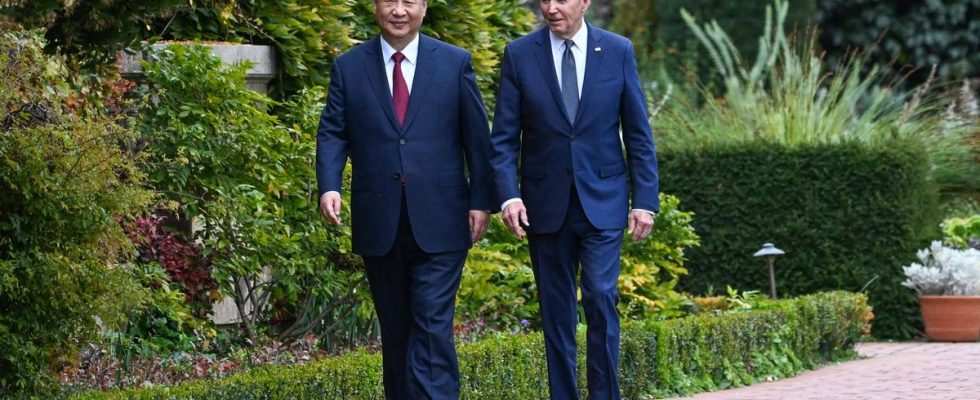Between handshakes and a little stroll (not hand in hand), Joe Biden and Xi Jinping demonstrated this Wednesday the return to dialogue between the United States and China. This face-to-face, particularly commented on, takes place in a very tense international context, torn by the war in Ukraine and, more recently, by that between Hamas and Israel in the Middle East. Best enemies, Beijing and Washington continue over the years their dance of dissension, mixed with short sequences of rapprochement.
The meeting took place about forty kilometers from San Francisco, in a plush residence. For a year, high-level military communications have been cut between the two countries and dialogue has proven difficult for several years. This rapprochement, more visible than real, is the mirror of an opportunity for each of the leaders. “The start of a very electoral period in the United States and the internal problems that Xi is encountering combine and lead the two leaders to want to appear as leaders on the international scene,” explains Jean-Vincent Brisset, associate researcher at the IRIS.
Talk to each other to better assess yourself
The Chinese president is in fact facing “strong political opposition”, two ministers have “disappeared from the landscape”, that of Foreign Affairs at the beginning of the summer then that of Defense in September, recalls the China specialist. Added to this is an economic situation that is much less flourishing than during the golden age of the Middle Kingdom. Across the Atlantic, Joe Biden is preparing to return to the presidential arena – which we know is particularly brutal in the United States. And Washington “cannot ignore a dialogue with China, which has become a major player over the last twenty years,” recalls Alessia Lefébure, sociologist and author of The Mandarins 2.0, A Chinese bureaucracy trained in the American style.
Geopolitical earthquakes repeatedly shake the world, from the Middle East to Eastern Europe and push the two powers to communicate, in order to gauge the position of the other but also to try, of course, to influence it. . “Both parties have an interest in keeping the channel of communication open, which allows them to negotiate their respective positions and possible alliances as the global situation evolves,” analyzes the specialist who has lived in China as well as in the UNITED STATES. “We are much more in communication than in a turning point in relationships,” slips Jean-Vincent Brisset.
A “reaffirmation of competition”
This meeting therefore does not mark a change in the Sino-American dynamic. It is rather “a sign of the need for the resumption of diplomatic dialogue and the reaffirmation of competition between the two powers”, notes Alessia Lefébure, who adds that the “sometimes aggressive declarations that each of the leaders makes” are “essentially » declaimed “for internal political purposes”. Thus, Joe Biden described his Chinese counterpart as a “dictator” after their meeting.
The Chinese Foreign Ministry was moved, calling it an “extremely erroneous” speech and “irresponsible political manipulation”. But, in reality, the head of state thus appeals to the American electorate who are “very anti-China” without really putting Xi at risk since “the Chinese will not be aware of this declaration”, according to Jean-Vincent Brisset. Concretely, the visit only gave rise to signals in favor of better communication. Thus, the leaders noted the resumption of high-level military communications, suspended for a year, and the American president affirmed that they had agreed to call each other “directly” and to be, if necessary, “heard immediately”.
Power play, from exports to UN votes
“There was always communication, even if it was sometimes rougher,” tempers Jean-Vincent Brisset. The eternal rivals are far too aware of their interconnectedness to stop talking. The real power play lies more on the economic side for the United States, which continues to hold China by the throat in this area. “Beijing is very vulnerable to American sanctions – unlike Russia which is much more self-sufficient – with the United States being its main buyer,” recalls the researcher associated with IRIS.
As for China, “it has been theorizing for several years, via a large number of Chinese intellectuals and academics, a vision of international relations radically alternative to that of the West” and “positioning itself as the leader of a large number countries of the “global south” which are opposed to the world order inherited from colonialism or the Cold War,” explains Alessia Lefébure. Much more than in declarations and handshakes in front of crackling flashes, the balance of power is analyzed in terms of exports and votes at the UN, where many countries today follow China much more than the West.

